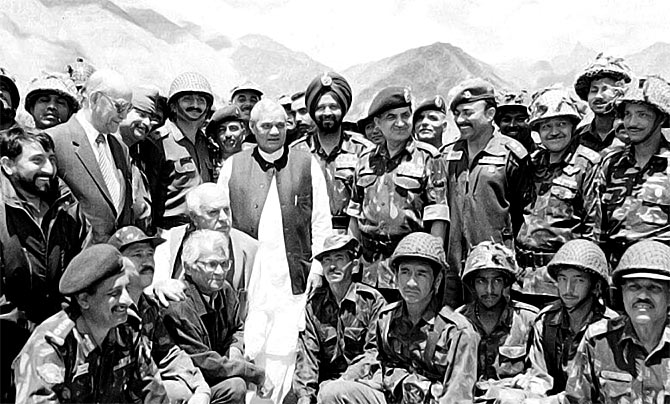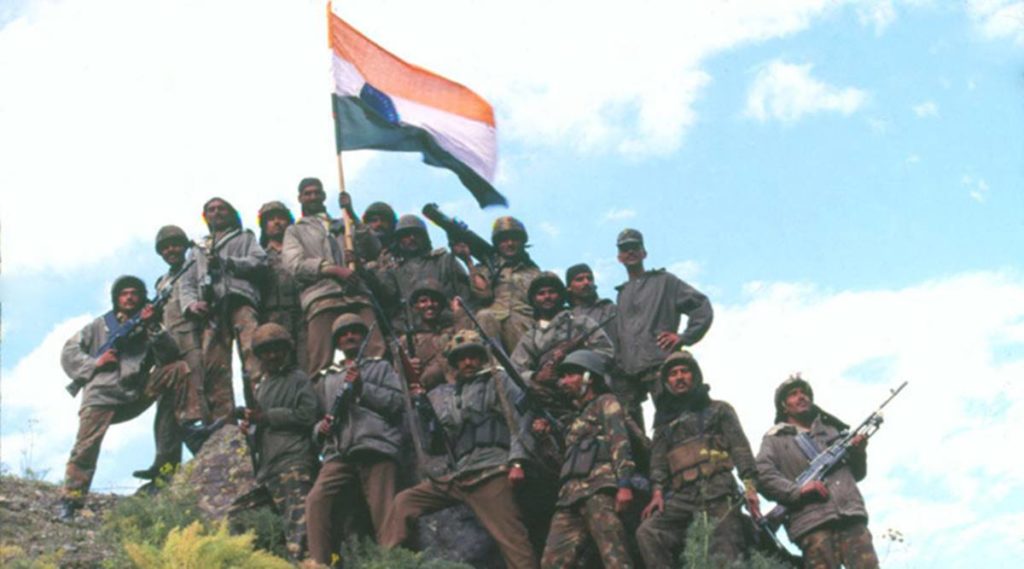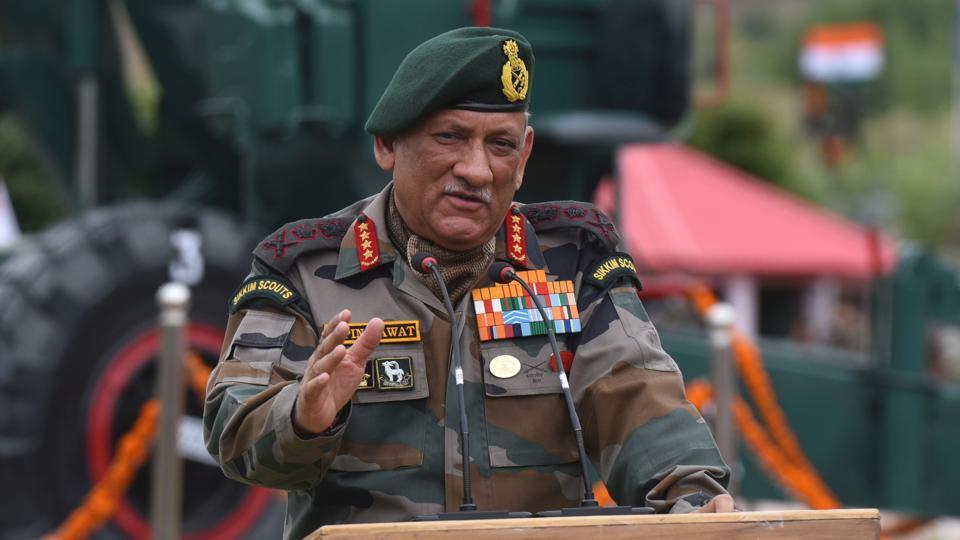Two decades of the historical Kargil war victory

The victory of the Kargil War is one of the most celebrated ones in Indian history. On July 26, 1999, India regained all the peaks that had been seized by the Pakistani army.
Twenty years earlier, on this day, the Indian army etched a historic victory in Kargil by regaining control over the strategically important peaks that had been intruded by the Pakistani army. With this year’s theme of Kargil Vijay Diwas being ‘Remember, Rejoice and Renew’, the entire nation has been swept by the wave of patriotism and respect for the Indian army. Here is all about this historic battle.
May 2, 1999. It was another regular evening for Tashi Namgyal, a local shepherd in the mountains surrounding Kargil, Ladakh. He was enjoying his stroll amidst the beautiful stretches of Kashmir, often called the heaven on earth. It was when one of his yaks went missing and he started scrutinising the area vigilantly, when he observed few men clad in some uniform, breaking stones and clearing the snow. Some of them even possessed weapons. What added to his confusion were the missing footprints leading to the site, which suggested their arrival was from across the border. Like any other responsible citizen, he took no time to report to the Indian army what he had observed.
The Indian army immediately sent patrols to the site who mistook the infiltrators to be militants or terrorists. However, the entire nation sat back in horror when the official identification cards and other documents reeked of the Pakistani army’s authority. When the Indian army submitted the bodies of those belonging across the border, Pakistan refuted all the claims. Thus, begun the war which has etched its presence in Indian history forever.
A saga of betrayal
At that time, both India as well Pakistan had aced nuclear developments. Three months before the Kargil intrusion, India and Pakistan had signed up for a bilateral agreement, the Lahore Treaty for strengthening the peace ties between two nations. The agreement refrained both the countries from the usage of nuclear weapons. In the wake of these ongoing efforts for the maintenance of peace, this intrusion came across India as an act of betrayal.
The Pakistani army was trying to get complete control over NH1 to cut all the links between Ladakh and Kashmir and later take advantage of the situation and get their demands fulfilled over the heated issue of Kashmir. Around 5,000 Pakistani soldiers had intruded in India, crossing the Line Of Control (LOC), to achieve this target. It was a part of what they called Operation Badr. Pakistan even blocked ration and ammunition supplies of Indian army at forwarding posts by shelling NH1 A. The then army chief of Pakistan, Parvez Musharraf was the mastermind of this operation, which was unknown to even the then prime minister of Pakistan, Nawaz Sharif.
A strategic victory

Indian Army, Indian Navy and Indian Air Force joined their hands to give Pakistan a taste of its own medicine during the Kargil war
Soon, the Indian army deployed thousands of soldiers who started tracing the intruders. The freezing temperature of minus ten-degree Celsius at such a high altitude couldn’t deter the spirit of the Indian army; Operation Vijay was in full swing. India’s first strategic win was the recapturing of Tololing peak on June 13, 1999. This peak stationed at the Siachin glacier overlooking Srinagar-Kargil- Leh highway is of great strategic importance to India.
The Indian army decided to give the Pakistani army a taste of its own medicine by strengthening its presence around Pakistan through the land, air as well as water. The Indian Navy patronaged an aggressive Operation Talwar wherein it blocked all the important Pakistan ports and the Indian Air Force started Operation Safed Sagar in full swing in which enemy sites were bombed. In either of the operations, the army men refrained from crossing the border, since the war had not been announced officially, yet.
Gripped in panic, Pakistan tried seeking help from international powers, United States of America (USA) and China. Both these economies, however, did not extend any support and while China maintained a neutral stand on the issue, USA ordered Pakistan to withdraw its troops from Kargil immediately.
On July 26, 1999, India regained complete control over all its strategically important peaks that had been earlier intruded by the Pakistani army. India lost over 500 of its soldiers during this battle that continued for a stretch of 17 days.
Though India won the battle, it realized the shortcomings on its part that acted in the favour of enemies. Had it not been for the shepherd’s alertness, India would have had to face a lot of trouble. Thus, a committee was established to probe into the shortcomings in India’s intelligence plans and ensure a more vigilant security system.
Celebrating two decades of valour

Army Chief Bipin Rawat warns Pakistan of an even more fierce response if any episode like Kargil is repeated in the coming future
A wave of pride, patriotism and remembrance took over the nation today. Celebrations of the anniversary could be seen all over the nation. ‘Remember, Rejoice and Renew’ was this year’s theme. Indian army men and sportsmen carried the victory flame in a relayed fashion from New Delhi to the Kargil War Memorial in the Kargil-Drass sector, travelling over 11 towns and cities. The flame was received by the Indian army chief Bipin Rawat. “Don’t do it. Misadventures are normally not repeated. You will get a bloodier nose next time,” said Rawat earlier today when asked to give a message to the Pakistan army.
Rawat also released a song ‘Tujhe Bhulega Na Tera Hindustan’ (Your India won’t forget you) on the occasion, in the honour of all the martyrs. The song features many Indian celebrities.
Defence minister Rajnath Singh and the service chiefs of the Indian navy and Indian air force were also present there. President Ram Nath Kovind was also planning to attend this tribute, but couldn’t reach Kashmir owing to bad weather. He paid his homage by laying a wreath at the war memorial at the Army’s 15 Corp headquarters in Srinagar.
Many politicians and celebrities including Indian Prime Minister, Narendra Modi, President Ram Nath Kovind also took to Twitter to commemorate the day.
On #KargilVijayDiwas, paid tributes to our martyrs at Chinar Corps (15 Corps) War Memorial in Srinagar.
India remains grateful to those in our Armed Forces who served in the Kargil conflict and defended our sovereignty with incredible valour.
Jai Hind! ??#PresidentKovind pic.twitter.com/5ppenPsC1d
— President of India (@rashtrapatibhvn) July 26, 2019
During the Kargil War in 1999, I had the opportunity to go to Kargil and show solidarity with our brave soldiers.
This was the time when I was working for my Party in J&K as well as Himachal Pradesh.
The visit to Kargil and interactions with soldiers are unforgettable. pic.twitter.com/E5QUgHlTDS
— Narendra Modi (@narendramodi) July 26, 2019
Maharashtra decided to honour the Indian army and the martyrs by staging special shows of the recent patriotic film, Uri: A Surgical Strike in the honour of the Indian Army. The film was released in over 500 screens.
A week-long celebration of Kargil Vijay Diwas has also been flagged by the ministry of home affairs whose operation will be taken care of by the border guarding forces. The celebration will include cultural events, photo galleries, health camps as well as motivational seminars for the families of the martyrs and gallantry award recipients, and will continue till July 27, 2019.









